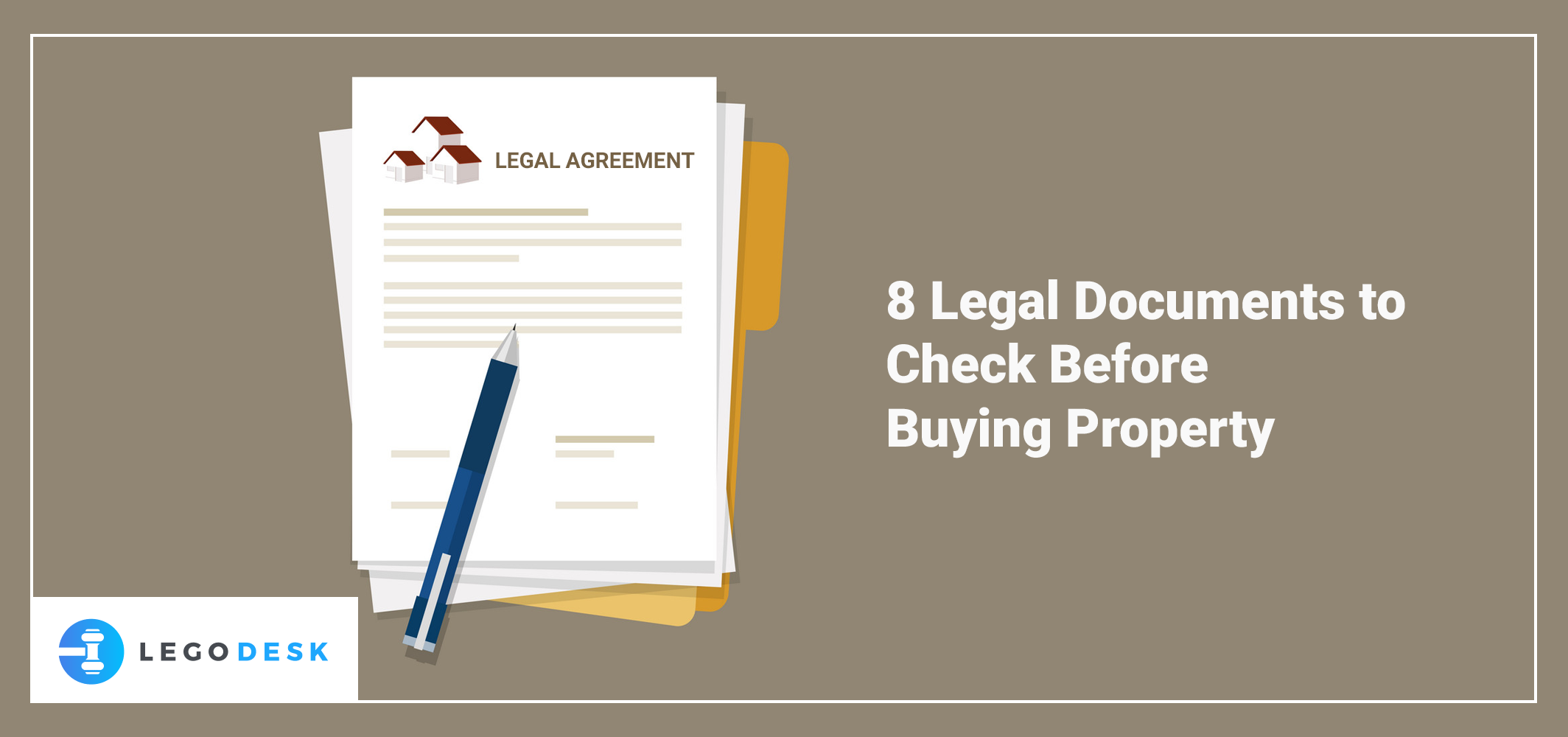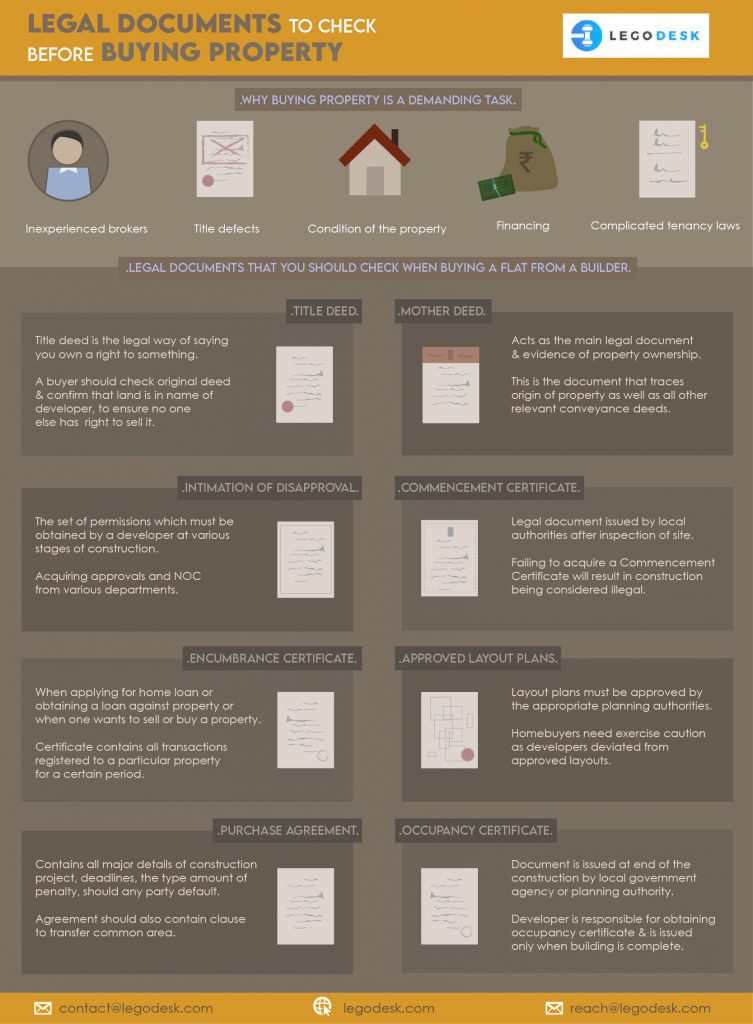8 Legal Documents to Check Before Buying Property
Buying property anywhere in the world can be a long and drawn out experience. However, in India, buying property is a particularly demanding task with several possible hurdles along the way such as inexperienced brokers, title defects, complicated tenancy laws, the condition of the property itself, and financing, to name just a few. It is therefore important that the entire procedure is dealt with systematically to reduce the hassles that accompany it.

The exact laws governing the sale of the property might be slightly different in different states, but there are a few permissions and documents a builder or promoter must have if they are selling flats. Here are the legal documents that you should check when buying a flat from a builder:

1. Title Deed
Title deed is the legal way of saying you own a right to something. For real estate purposes, the title refers to ownership of the property, meaning that you have the rights to use that property. It may be a partial interest in the property or it may be full. However, because you have a title, you can access the land and potentially modify it as you see fit. The title also means that you can transfer that interest or portion that you own to others.
A buyer should check the original deed and confirm that the land is in the name of the developer, to ensure that no one else has the right to sell it. It is advisable to get the title reviewed by a lawyer.
Click here for Estate Planning Pekin IL
2. Mother Deed
Mother deed acts as the main legal documents and evidence of ownership of a property. It also acts as the main document for further sale by the buyer as it establishes proof of his ownership. Mother deed is an important document in a property transaction. This is the document that traces the origin of property as well as all other relevant conveyance deeds.
Read Also: Different Types of Mortgage
It is the main document to determine ownership of a property. Tracing ownerships should always begin with the scrutiny of the earliest document recorded. If such documents are not made available, certified copies have to be obtained from the registering authorities. This process should not be ignored. Earlier documents are called mother or parent documents.
3. Intimation of Disapproval (IOD)
This is a set of permissions which must be obtained by a developer at various stages of construction. ‘This would involve acquiring approvals and a No Objection Certificate (NOC) from various departments such as the Storm Water and Drain Department, Sewage Departments, Forest Department, Environment Department, Traffic and Coordination Department, Chief Fire Officer, Airport Authority and Pollution Board, among others.
4. Commencement Certificate(For under-construction site)
A Commencement Certificate is a legal document issued by the local authorities after the inspection of the site. This document states that the project meets the give criteria and helps in the commencement of construction on a site by the builder. Failing to acquire a Commencement Certificate will result in the construction being considered illegal, levy penalties and can even attract an eviction notice.
5. Encumbrance Certificate
The encumbrance certificate is important for those applying for a home loan or obtaining a loan against property or when one wants to sell or buy a property. “Encumbrance” means that the liabilities created on a particular property, whereby it is held as a security for any debt of its owner, which has not been discharged as on date. An encumbrance certificate contains all the transactions registered relating to a particular property for a certain period (as required). These details also consist of any claims or encumbrance on the property.
6. Approved Layout Plans
The layout plans must be approved by the appropriate planning authorities. Homebuyers need exercise caution as there have been cases where developers deviated from the approved layouts, by adding extra floors or reducing open areas.
7. Purchase Agreement
The agreement contains all major details of the construction project such as the project specification, apartments, payment terms, completion deadlines and the type and amount of penalty, should any party default. The agreement should also contain a clause to transfer the common areas to the society. This ensures the plot remains with the original owners and that the developer cannot engage in further construction on this land.
8. Occupancy Certificate
Certificate of Occupancy or completion certificate is a document which is issued at the end of the construction by a local government agency or planning authority. The legal documents are proof of the building’s compliance with applicable building codes and other laws. It indicates that the property is in a suitable condition for occupancy. The developer is responsible for obtaining occupancy certificate and is issued only once the building has been completed in all respects and is ready to be occupied. A completion certificate is received by the builder from the metropolitan authorities upon completion of construction.
Try our Debt Resolution solutions today Request a Demo
For over 13 years the no broker time has been a leading platform for cloud-based floor & space planning. We are a stable partner for over 200 smaller and bigger companies worldwide that offer floor planning services via our platform. We provide mature APIs’ for deeper integrations and connections to other technologies and apps.TD housing is the best and simplest way to find a property with full support from td housing one of the best developers in Bangalore